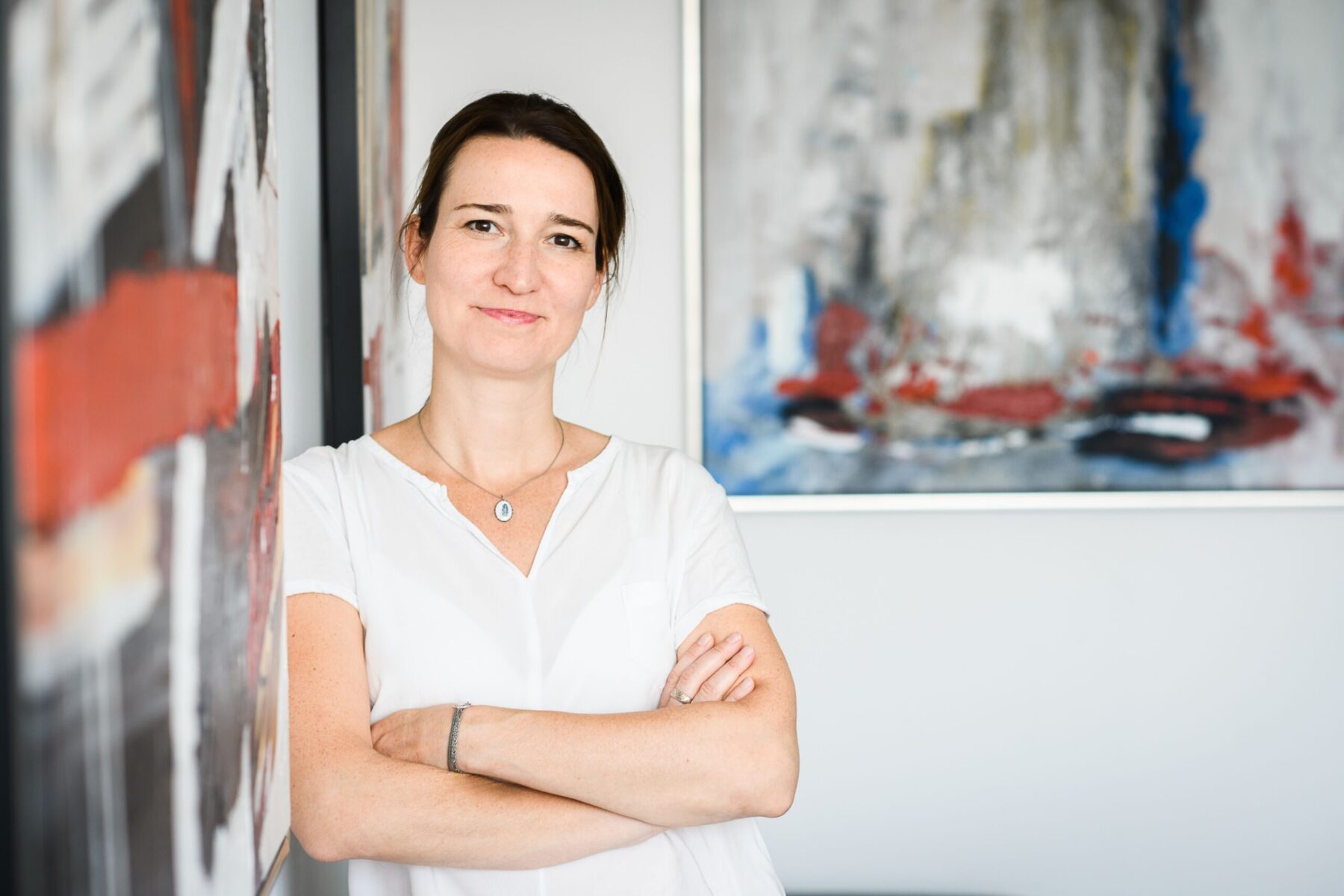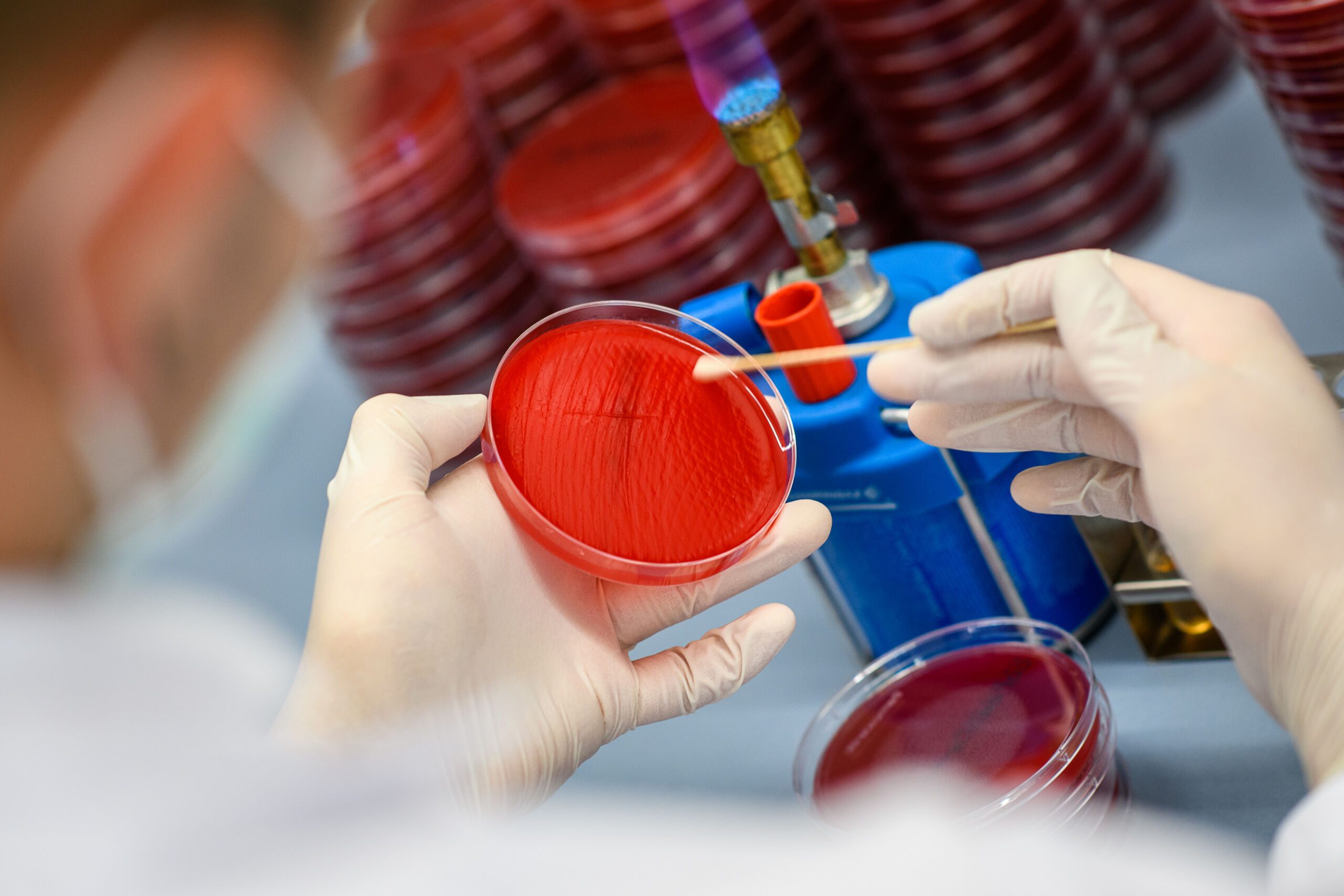
An entrepreneur and her story
With RIPAC-LABOR GmbH, Dagmar Köhler-Repp has written start-up history in the capital region. Now her company is set to grow further in the Potsdam Science Park. We get closer to perhaps the most exciting founder personality in Brandenburg.
It is not easy these days to meet Dagmar Köhler-Repp for an interview. Work in the RIPAC-LABOR laboratories is in full swing. For Köhler-Repp as Managing Director, this also means she’s very busy. Nevertheless, she has taken the time for a written interview with us:
Success story from Potsdam-Waldstadt
The microbiologist from Potsdam is regarded as one of the most interesting founding personalities in Brandenburg, perhaps even beyond, and in a business that is otherwise not exactly bursting with prestige: veterinary medicine. With her company, RIPAC-LABOR GmbH, she has specialised in the field of infection diagnosis and prevention. Her clients include veterinarians who submit samples from bacterially diseased farm or zoo animals. Köhler-Repp and her team then develop customized vaccines that will prevent further infections.
RIPAC-LABOR is active throughout Europe and is represented in projects with well-known partners such as the University of Potsdam and Fraunhofer Institutes. Dagmar Köhler-Repp cannot complain about a lack of attention in other respects either: For her work she was awarded the title “Entrepreneur of the State of Brandenburg” (german article) in 2014 – since then the number of inquiries has been increasing: Since July 2020 she can be seen in a video of the Federal Ministry of Finance, for which she talks about her career in the post-reunification period on the occasion of 30 years of monetary union (german content). Anyone researching Dagmar Köhler-Repp will quickly notice a pattern in the reporting on her. It is always about the founding history of RIPAC-LABOR, which was her entry into entrepreneurship. One understands why this story is so enticing for the press and politicians. It is above all one thing: a classic “self-made” story. The founding of RIPAC-LABOR has it all – simple beginnings, obstacles, a happy ending and a resourceful protagonist.
The short form of this story goes like this: Dagmar Köhler-Repp is in her mid-20s and had just gotten her biology diploma when her father, Bernd Köhler, who is a veterinarian himself and active in bacteriology research, comes up with an idea: During his work, Köhler had realised that certain diseases in pigs, ducks and chickens could be more effectively combated with tailor-made vaccines instead of antibiotics. He suggested to his daughter that she open a private laboratory and produce appropriate, stock-specific vaccines for livestock. The daughter agrees and founded RIPAC-LABOR in 2002 – in the basement of her parents’ house in Potsdam-Waldstadt, with herself as the only employee. She did not always have an easy start. Her father supports her in acquiring her first customers and she is able build on his experience and network. But the banks she approaches often don’t take her seriously. The young woman simply wants to open a business account, but is asked to present a business plan first. When Köhler-Repp explains that she does not have one, many reject her. Nevertheless, the company soon prevails. The demand in the industry is there. Soon Köhler-Repp is able to generate sales and hire employees. From then on, the company’s business is on the upswing. In 2007, RIPAC-LABOR moves to the GO:IN Golm Innovation Centre I (GO:IN I) in the Potsdam Science Park – and has officially arrived.
It is this “start-up legend” that interests many. Also because it is a story that invites us to talk about quite different things: About Germany as a location for innovation, the still not self-evident role of women as company leaders, or – as was the case recently – 30 years of German unification.
Successful entrepreneur with her feet on the ground
It is a pleasant moment of irritation to see Köhler-Repp seems to take little notice of such narratives, but instead subtly undermines overly stereotypical interpretations of her career time and again. Anyone watching her video on 30 years of monetary union can admire an authentic performance: Köhler-Repp does not speak polished media German, she is an authentic narrator. In her introductory anecdote, she tells of the first trip to the West with her parents, of overcrowded buses, the Glienicke Bridge and the Ku’damm with its stalls for the welcome money – only to abruptly confess: “I then took this to save up. I didn’t buy anything at first.” Pretty sober for a teenage girl in reunification Berlin. It’s moments like this that make her approachable.
Köhler-Repp doesn’t want to speak of humble beginnings in her case. “Rather level-headed and lasting,” she explains. RIPAC-LABOR is “a garage company in the original sense” and has grown organically to this day, which she is very proud of. However, it is precisely the cliché of the “garage entrepreneur” (male, smart, and always “disruptive”) that she counters with a refreshing alternative – also and because this cliché has recently not only been attributed to some well-known founders such as Steve Jobs or Elon Musk, but has also been and is actively cultivated by them. This kind of self-dramatization is not Köhler-Repp’s thing. She finds the personal attention flattering, but above all it shows her that “[…] the decisions and developments we have made and are making for the company were the right ones.” She prefers to talk about the achievements of others: there is practically no interview with her, not mentioning her father’s important role in the founding and continued success of RIPAC-LABOR. About her employees she says: “From a purely scientific point of view, our team was very well positioned from the very beginning. It was more challenging to turn the thoroughbred scientists into entrepreneurial employees. But I think we are on the right track here.” The fact that her husband joined the management team at an early stage also helped. She was able to be an entrepreneur and a mother: “We have found a good way to combine business and family.”

Spirit of optimism in the Potsdam Science Park
In addition, the Potsdam Science Park has opened up several opportunities for her: “Personally, I am deeply rooted in Potsdam. So what could be more natural than staying here with RIPAC,” she explains: “And for a young company, a technology-oriented innovation centre offers the best infrastructure: We could concentrate on the essentials and still have optimal surroundings, as well as enough room to grow if necessary.” The location in the capital region is also an advantage for personnel recruitment. Many young people are attracted to Berlin. The Potsdam Science Park is also an attractive place to work: “People like coming here. Everything is green, spacious, open and modern. We appreciate the intercultural interaction that is shaped by the scientific institutions. The ongoing expansion of the park gives them a positive impression. RIPAC-LABOR is now one of the long-established companies: “In 2007 it was much quieter.” In the GO:IN technology and start-up centre there were a few young companies and a good exchange of ideas at that time. That is still the case today, but there is a new spirit of optimism: “Looking out of the window we see every day that something new is being created.” Köhler-Repp emphasizes: “We are excited about the next phase,” and then ends with a typical punch line: “And we are happy if the construction noise at least eases off a little at some point.”
But before that, her company will make sure that it stays loud for a while: RIPAC-LABOR is the first company to buy a 1.1-hectare site in the Technology Campus of the Potsdam Science Park. It is planning its new headquarters here, for more than 100 employees – and with the option to expand. The company wants to develop further and strengthen its position in the market. Big plans, then. Dagmar Köhler-Repp will probably tackle them as she always has: prudently and sustainably.
Photo 1: Dagmar Köhler-Repp © Phil Dera
Photo 2: RIPAC-LABOR © Phil Dera
This blog and the projects of the location management at the Potsdam Science Park (Standortmanagement Golm GmbH) are funded by the European Regional Development Fund (ERDF) and the State of Brandenburg.